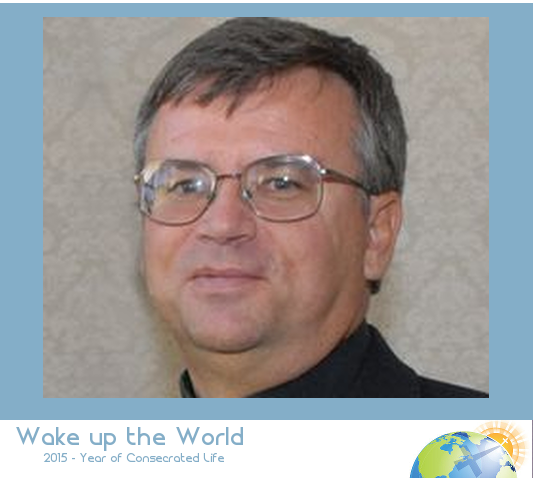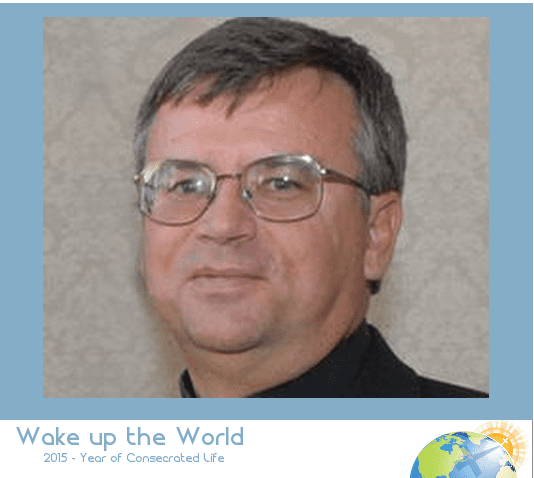Baffled – Pat Griffin
 “Baffled” – Pat Griffin continues his series “Considering Consecrated Life”
“Baffled” – Pat Griffin continues his series “Considering Consecrated Life”
You know how it is when you have a birthday party for a child. The room can overflow with balloons bobbing up from the chairs, streamers hanging from the ceiling, colorful centerpieces crowding the tables, and wildly wrapped presents waiting in a corner. Noisemakers and shouting children make normal hearing impossible. Cake and ice cream and soda and candy abound. One can feel the sensory overload. A child’s eyes literally get bigger. He/she does not know where to look first, what to do first, whom to greet first. Adults have similar experiences, though we might be less inclined to claim them.
The encyclical of Pope Francis on the environment, Laudato Si’, can have that effect on a person. As I read it, I did not know what to think or feel first. I wandered among touched, thoughtful, guilty, angry, and resolved, in addition to a host of other reactions. A powerful document, it shows understanding and concern for the poor throughout. For a Vincentian, it offers a meditation and examination of conscience as well as a direction for ministry. I know that I want to say something about this document, but I do not know where to begin.
Finally, I have decided to focus on one paragraph which gave me pause and which offers some insight into our world. Perhaps it is less about ecology than a sense of sanctity, but Francis draws them together throughout his writing.
Christian spirituality proposes an alternative understanding of the quality of life, and encourages a prophetic and contemplative lifestyle . . . . A constant flood of new consumer goods can baffle the heart and prevent us from cherishing each thing and each moment. To be serenely present to each reality, however small it may be, opens us to much greater horizons of understanding and personal fulfillment. (Laudato Si’, Francis, 24May2015, 222)
Around the question of Christian spirituality, he speaks about the way in which a constant flow of new gadgets and possibilities can “baffle the heart.” We can imagine what this suggests. When we speak of someone as “baffled,” we mean that he/she is totally confused and unsure of which way to think or move. The word often occurs in mystery stories. It usually refers to the mind, but Francis applies it to the heart. I grasp his intent.
He goes on to speak of this regular flood of input as preventing us from “cherishing each thing and each moment.” Again, he uses a word related to the heart, “cherish.” With a constant tide of material and ideas, with the regular need to update and replenish, little effort and less time remain for reflecting on the immediate and its value. Discovery and attentiveness get pushed aside as we focus on the next hill and the next river. One might characterize this as “not letting grass grow under one’s feet,” and being constantly creative with an openness to new possibility, but that is not the way of an explorer or an artist. Time needs to be spent getting to know the current landscape. The story of Genesis insists on the Sabbath day as a day of rest, not simply—or even principally—to recover from exhaustive work, but to appreciate the beauty of that which has already been summoned into being and which cries out for attention and admiration and gratitude. These are virtues of the heart.
Rest opens our eyes to the larger picture and gives us renewed sensitivity to the rights of others. And so the day of rest, centred on the Eucharist, sheds its light on the whole week, and motivates us to greater concern for nature and the poor. (Laudato Si’, 237)
You know how it is when you are at table and the group is in a hurry. There is no time for tasting this or savoring that, we need to move. “Take what you need and eat it in the car!” Or when you go for a visit to someone whom you love, but there are only a few minutes to talk. “Okay, now you have seen each other, so let’s go.” How about being in a museum and watching people examine the paintings. A number of people are there because one must visit the Louvre when one is in Paris, but there is no time for stopping. “There is the Mona Lisa; there, the Venus de Milo; the bus leaves in 30 minutes.” In all these circumstances, little time remains for the soul, for cherishing with the heart. One finds the mind of a consumer.
How difficult it is to “cherish each thing and each moment” as Francis suggests. A “romantic” cast characterizes some of his writing, but one might more properly call it “human.” It is belittled (as I have seen) by the characterization of his ecology as “talking to the animals.” In this section of his encyclical (§222), Francis invites us to recognize that an effect of “consumerism” is not just the exploitation of our world’s resources, but the surrender of one’s heart and soul. We become baffled by the constant barrage of things and ideas which leaves scant time and desire to “smell the roses.” A child of the Creator needs and deserves more.







0 Comments